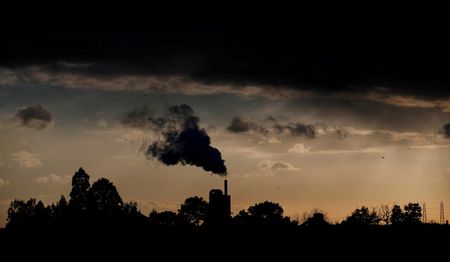By Susanna Twidale
LONDON (Reuters) – Britain has launched a 12-week consultation on measures such as a potential carbon border tax in an effort to protect businesses against cheaper imports from countries with less strict climate policies.
The domestic emissions trading system (ETS) that charges power plants, factories and airlines for each tonne of carbon dioxide they emit is part of British efforts to reach net zero emissions by 2050, but the Department for Energy and Net Zero said it is looking at ways to prevent so-called carbon leakage – a term used to describe when companies relocate production to countries with looser emissions targets and lower carbon costs.
Many countries have put a price on carbon emissions, but these vary greatly. The price of spot carbon allowances in Britain’s ETS currently stands at about 70 pounds ($86) a tonne while allowances in China’s ETS, for instance, trade around 57 Chinese Yuan ($8.28) per tonne.
Potential measures to prevent carbon leakage could include a carbon border adjustment mechanism (CBAM) applied on imports to reflect both the carbon emitted in their production together with any gap between the carbon price already applied in the country of origin and the price in the UK, the consultation document said.
Other measures could include a standards requirement on emissions caused by imported products or demand-side policies such as public procurement initiatives to expand markets for lower-carbon products.
Europe also has an ETS and plans to phase in a carbon border tax from 2026 on imports of carbon-intensive steel, aluminium, cement, fertilisers and electricity.
($1 = 0.8095 pounds)
($1 = 6.8808 Chinese yuan renminbi)
(Reporting by Susanna Twidale; Editing by David Goodman)





